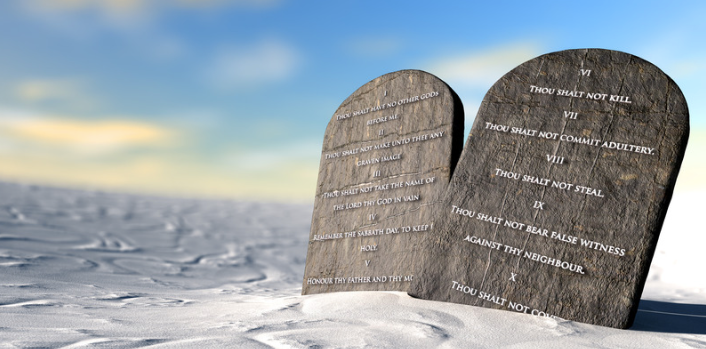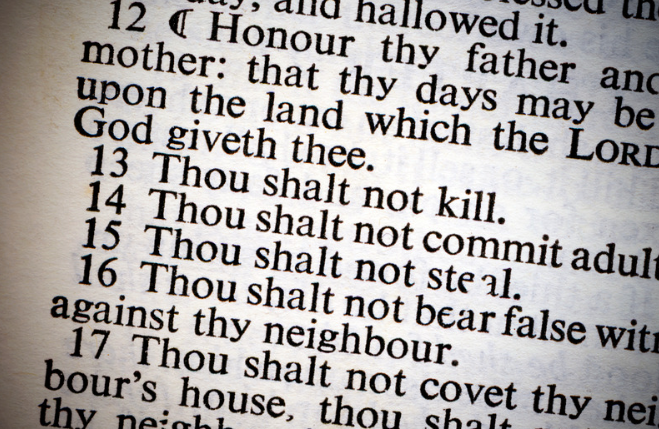Here is the twelfth installment of our Exodus series. If you want to take a minute to read Exodus 20, click HERE. And if you missed the last column in this series, click HERE. As always, we will walk through the text and highlight aspects that are not typically noticed, and then conclude with a few themes for ecological discipleship. Thoughts and comments are welcome. - James.

Creative Words
We have reached a pivotal moment for the people of Israel and for God - the giving of the Law at Mt. Sinai. Egypt is firmly in the rear view mirror. The promised land of Canaan lies ahead of them. The people have gathered at the foot of the mountain. God has descended in cloud and smoke. What is said and done here will set a course for their future. Not just where they are going, though that is important, but who they will be and whose they will be.
The opening is important: "And God spoke all these words." I hear in this an echo of the creation pronouncements in Genesis 1 ("And God said..."). With these words, God speaks a new community into existence, a distinctive people marked by their allegiance to the Creator, their care for one another, and their distinct mission to be God's priests in the world. I will use "word" or "words" throughout this column to preserve this sense of creative speech.
The first word is this: "I am Yahweh, your God, who brought you out of Egypt, out of the land of slavery." This first word is relational and liberational, a reminder that the words that follow come from the one who heard the cries of the people in their slavery and oppression and delivered them. All the words that follow are rooted in this relationship.
Three Words for Relationship with God
It is not surprising, then, that the first commanding word is about relational loyalty: "You shall have not other gods before me." Whether or not we take "gods" literally or figuratively (I think we can take it both ways), the liberating God of Israel requires exclusive loyalty. This extends into the second word: "You shall not make an image in the form of anything in heaven above or on earth beneath or in the waters below. You shall not bow down to them or worship them." God knows the temptation will be to "capture" the divine in an object or place, which reduces (in our minds) both God's holiness and the world's. The third word continues the theme: "You shall not misuse the name of Yahweh your God."

The Word that Ties Things Together
The fourth word is a hinge connecting the people's relationship to God with their relationships to one another and the earth. "Remember the Sabbath day by keeping it holy." This command is followed by the longest description and rationale of any of the commands. "Six days you shall labor and do all your work, but the seventh day is a sabbath to Yahweh your God." While the other words may have been easy for Israel to understand, or may have had precedent in other Ancient Near Eastern law codes, this one was most likely a true innovation - a mandated, weekly work stoppage for every person (no matter their status) and working animal. "On it you shall not do any work, neither you, nor your son or daughter, nor your male or female servant, nor your animals, nor any foreigner residing in your towns."
While other biblical texts root Sabbath-keeping in Israel's experience as slaves in Egypt, here it is rooted in the order of creation. "For in six days Yahweh made the heavens and the earth, the sea, and all that is in them, and he rested on the seventh day. Therefore Yahweh blessed the Sabbath day and made it holy." Regular rest is part of God's design, intended to permeate heaven, sky, earth, and sea, and include all the creatures who live there. Humans are the creatures that must choose this rest, for it does not come naturally to us. This is why the Sabbath is such a gift to us, a "sanctuary of time" that invites us to re-member (put back together) who we are, where we are, and who we are called to be. In other words, keeping the Sabbath keeps us human.

Six Words for Community-keeping
The final six words focus on community formation, protection, and cohesion. At the heart of these words is a call for mutual respect and trust. There is the building block of family - "Honor your father and mother" - which is probably aimed less at young children respecting their parents' instruction than at adult children making sure their older parents are cared for. This positive command is followed by four prohibitions: "Do not kill"; "Do not commit adultery"; "Do not steal"; "Do not give false testimony"; and "Do not covet...anything that belongs to your neighbor." These negative words carry implicit positives: respect life; keep your promises; respect what others have; tell the truth; be content with what you have.
These ten words are the foundation stones around which Israel is called to organize its relationships with God, one another and the earth. There is much to glean for our journeys of ecological discipleship - here are two themes to consider.

The Ten Words as Relational Guideposts
These ten words are both clear and unclear. They clearly call for exclusive loyalty to God, a day set aside for rest, and the preservation and protection of community life. But they also require interpretation. What "gods" might we be tempted to put before the Creator? What images are innappropriate? What does it mean to misuse God's name? How do we keep the Sabbath? What does honor look like in families? Does the prohibition on killing only refer to murder? What defines adultery, theft, false witness, and covetousness?
These questions are taken up, in part, by the specific laws of the Old Testament. But even the extensive law codes in Exodus, Deuteronomy, and Leviticus do not anticipate every situation Israel might encounter - the Law needs constant interpretation and application. This is what Jesus is doing in the Sermon on the Mount. This interpretive task is a gift, because it keeps relationships at the center. Every community must continue to ask what it means to worship God, care for one another, and order our life in harmony with the order of creation.
This means that, though the ten words do not focus much on the more-than-human world, we must ask what they say about these relationships in light of our current planetary crisis. Here are just a few questions that come to mind. What does it mean that we have spent that last few centuries trying to become "gods" who can manipulate and shape the world to our own creative desires? Do we see our idols when we look in the mirror? What does the Sabbath look like in a time of ceaseless production and technological connection? What does "Do not kill" mean in an age when humans are responsible for ongoing mass extinctions of our fellow creatures? What are the consequences of covetousness in light of centuries of colonial land-grabbing? These questions require answers that can only be forged through intentional relationships with God, one another, and the world around us.

Sabbath Is the Gift that Keeps on Giving
In a world that is clearly out of balance, sabbath keeping is a practice that continues to offer regular opportunities for correction. When we practice Sabbath, we rest from our work and are simply part of creation. We also resist the drumbeat of ceaseless production and attention that keeps us glued to our workplaces and technological tools. We have time to recover from the perpetual spinning wheel and reclaim a different way of life.
Most of us are far removed from being able to keep Sabbath in a communal way. I sometimes envy Jewish communities that are set up to keep sabbath together. It is hard to create "sanctuaries of time" without that cultural support! With that in mind, I wonder what little sanctuaries we can create, moments of intentional rest that give us a chance to breathe. Lately, I have been taking 20 minutes out of my work day to walk the country lane behind my office. No checking email. No phone calls. Just breathing, walking slowly, and attending to the birdsong, spring smells, and occasional fellow-walkers who come my way. It is not exactly a "sabbath day to Yahweh" as envisioned in Exodus, but it is sabbath-like, and that is a good thing.
With you on the Way,
James
Leave a comment below or email me directly at james.amadon@circlewood.online.